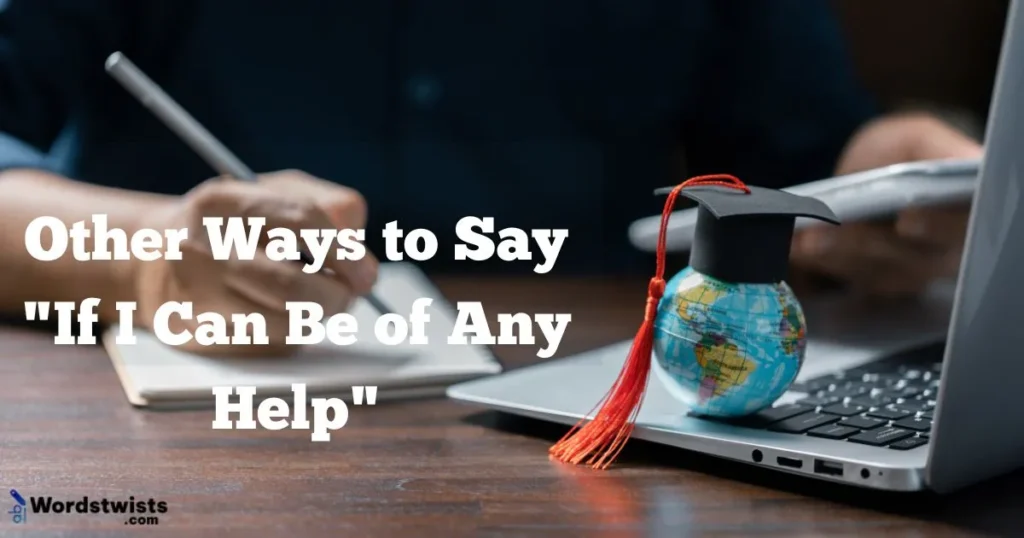Have you ever noticed how often we say “If I can be of any help”? It’s a polite phrase, sure, but after a while, it starts to sound a bit stale and overused. If you’re like me, you want your words to feel fresh, sincere, and powerful—whether you’re writing an email, chatting with a friend, or speaking in a meeting. Using the same old phrase over and over can make your message blend into the background, losing the personal touch and professional warmth you want to convey.
That’s why I’ve put together this list of 25 creative, clear, and friendly alternatives to “If I can be of any help”. These phrases will not only spice up your vocabulary but also make your offers of support sound more thoughtful and genuine. Whether you want to sound formal or casual, direct or encouraging, you’ll find options here that fit your style perfectly.
Ready to make your communication stand out with style and personality? Dive in and discover new ways to express your willingness to help—and watch how it changes the way people respond to you. Let’s jump right in!
Alternatives to “If I Can Be of Any Help
1. Please let me know if you need assistance.
This phrase sounds polite and straightforward, making it perfect for both professional and casual settings. It invites the other person to ask for help without pressure.
Usage examples:
- Please let me know if you need assistance with your project.
- If anything isn’t clear, please let me know if you need assistance.
- I’m available all day, so please let me know if you need assistance.
- Please let me know if you need assistance preparing the report.
- Don’t hesitate, please let me know if you need assistance.
Why it works:
It’s clear, respectful, and shows willingness without being pushy. Using “assistance” also makes it sound professional.
2. I’m here to support you.
This phrase is warm and caring, showing genuine emotional support beyond just offering help.
Usage examples:
- Remember, I’m here to support you through any challenges.
- If you need guidance, I’m here to support you.
- I’m here to support you during the transition.
- Don’t forget, I’m here to support you whenever needed.
- I’m here to support you in any way I can.
Why it works:
It communicates not just help, but emotional and moral support, making your offer feel more personal.
3. Don’t hesitate to reach out.
A popular phrase, it encourages communication openly and without fear of bothering the other person.
Usage examples:
- Don’t hesitate to reach out if you have questions.
- If you need clarification, don’t hesitate to reach out.
- Don’t hesitate to reach out anytime you want.
- Feel free to contact me—don’t hesitate to reach out.
- Don’t hesitate to reach out if I can assist in any way.
Why it works:
It reduces barriers to asking for help and makes your support feel approachable.
4. I’m happy to lend a hand.
This casual and friendly phrase creates a relaxed tone while still offering genuine help.
Usage examples:
- I’m happy to lend a hand with organizing the event.
- If you’re overwhelmed, I’m happy to lend a hand.
- Just let me know—I’m happy to lend a hand anytime.
- I’m happy to lend a hand with the setup.
- Don’t worry, I’m happy to lend a hand whenever you need.
Why it works:
The phrase feels warm and approachable, perfect for informal conversations or teamwork.
5. Feel free to ask for help anytime.
This one creates an open, ongoing offer of assistance, reducing pressure on the other person.
Usage examples:
- Feel free to ask for help anytime during your training.
- If you get stuck, feel free to ask for help anytime.
- Feel free to ask for help anytime—I’m here for you.
- No question is too small, feel free to ask for help anytime.
- Feel free to ask for help anytime, no matter the issue.
Why it works:
It encourages openness and continuous communication without formal barriers.
6. Let me know how I can assist.
This phrase is a bit more active than the original. It’s a friendly way to invite someone to tell you exactly what they need.
Usage examples:
- Let me know how I can assist with your research.
- If things get complicated, let me know how I can assist.
- I’d love to be useful—let me know how I can assist.
- Let me know how I can assist in making the process smoother.
- Let me know how I can assist before the meeting starts.
Why it works:
It invites a clear response and shows you’re ready to take action. Using “assist” gives it a more professional tone while staying approachable.
7. I’m available if you need me.
This expression emphasizes your availability, showing that you’re present and ready when needed—without being overbearing.
Usage examples:
- I’m available if you need me to review the document.
- I’m available if you need me, just ping me.
- During this project, I’m available if you need me anytime.
- I’m available if you need me to jump in and help out.
- Just a heads-up—I’m available if you need me.
Why it works:
It’s casual and honest, showing dependability without forcing yourself into the situation.
8. Always ready to help out.
This phrase is relaxed and confident. It assures the other person that you’re dependable and prepared.
Usage examples:
- Always ready to help out with design tasks!
- If anything comes up, I’m always ready to help out.
- You know where to find me—always ready to help out.
- I’m always ready to help out when the pressure’s on.
- Stuck on something? I’m always ready to help out.
Why it works:
The phrase is full of energy and gives off a can-do attitude. It’s ideal for team environments and friendly workspaces.
9. Reach out if you want a hand.
This friendly option uses everyday English and feels super down-to-earth, like something you’d say to a close friend or coworker.
Usage examples:
- Reach out if you want a hand with the paperwork.
- Need help lifting those boxes? Reach out if you want a hand.
- I know it’s tricky—reach out if you want a hand.
- Reach out if you want a hand navigating the new system.
- I’ve done this before, so reach out if you want a hand.
Why it works:
It sounds authentic, like you genuinely care. “Want a hand” makes it less formal, more human.
10. I’m just a message away.
Modern, warm, and digital-friendly. It reassures the other person that help is close and convenient to get.
Usage examples:
- If you get stuck, I’m just a message away.
- I’m just a message away—don’t struggle alone.
- I know deadlines are tough; I’m just a message away.
- I’m just a message away if you’d like my opinion.
- I may be remote, but I’m just a message away.
Why it works:
It fits well in today’s remote and online communication world. It feels instant, easy, and comforting.
11. Count on me if you need support.
This one adds a layer of trust. It’s more than an offer—it’s a promise that you’ll be there.
Usage examples:
- You can count on me if you need support during training.
- Count on me if you need support with clients.
- When things get tough, count on me if you need support.
- Count on me if you need support managing your time.
- I’ve got your back—count on me if you need support.
Why it works:
It speaks directly to reliability. People love hearing that they can count on someone—especially when they feel unsure.
12. I’m willing to help however I can.
This one is open-ended, allowing the other person to guide what kind of help they want.
Usage examples:
- I’m willing to help however I can with your move.
- I may not know the full details, but I’m willing to help however I can.
- I’m willing to help however I can, even if it’s just moral support.
- I’m willing to help however I can—don’t hesitate to ask.
- I’m willing to help however I can, big or small.
Why it works:
It feels flexible and genuine. You’re showing you’ll help in any form, which adds kindness to your communication.
13. Let me know if you’d like some help.
This version gently puts the decision in the other person’s hands, making it perfect when you don’t want to seem pushy.
Usage examples:
- Let me know if you’d like some help organizing your files.
- Let me know if you’d like some help preparing for the interview.
- Let me know if you’d like some help walking through the software.
- I’m nearby—let me know if you’d like some help.
- Let me know if you’d like some help tackling that list.
Why it works:
It shows respect for boundaries. You’re offering, not forcing.
14. I’m ready to offer my support.
A clear and formal way to show your intentions. It’s great in professional emails or business settings.
Usage examples:
- I’m ready to offer my support with onboarding.
- If needed, I’m ready to offer my support on this campaign.
- I’m ready to offer my support during your transition.
- I’m ready to offer my support anytime during this process.
- I’m ready to offer my support—just say the word.
Why it works:
It feels professional and capable, signaling that you’re reliable and well-prepared.
15. Happy to be of service.
This classic phrase works beautifully when you want to sound both polite and helpful.
Usage examples:
- Happy to be of service anytime you need assistance.
- I’ve done this before—happy to be of service.
- If that’s helpful, happy to be of service!
- Consider it done—happy to be of service.
- Happy to be of service in any way that helps.
Why it works:
It’s short, sweet, and sounds professional with a kind tone, which is perfect for client-facing roles.
16. If you want, I can assist.
This phrase gives the other person the option without putting pressure on them. It’s clear, respectful, and leaves space for choice.
Usage examples:
- If you want, I can assist with the budgeting task.
- If you want, I can assist in proofreading your proposal.
- If you want, I can assist with reaching out to the client.
- I have some free time—if you want, I can assist.
- If you want, I can assist you in setting up the platform.
Why it works:
It combines professional tone with flexibility, allowing the recipient to feel empowered, not obligated.
Explore More: Other Ways to Say “Is It OK for You”
17. You can rely on me.
Simple and strong, this phrase conveys a deep level of trust and dependability. It tells the listener you’re someone they can count on—no questions asked.
Usage examples:
- If things get tough, you can rely on me.
- You can rely on me to take care of the details.
- When the deadline hits, you can rely on me to deliver.
- Don’t worry—you can rely on me to follow through.
- You can rely on me for full support.
Why it works:
It speaks to your reliability and loyalty, especially in moments of pressure or teamwork.
18. I’m here whenever you need.
This one is emotionally warm and inviting. It suggests ongoing availability in a gentle, caring way.
Usage examples:
- I’m here whenever you need to talk or vent.
- I’m here whenever you need help with the system.
- Just letting you know—I’m here whenever you need.
- Whether it’s now or later, I’m here whenever you need.
- I’m here whenever you need, no matter what.
Why it works:
It offers emotional safety and steady support, which builds connection and trust in any conversation.
19. Don’t hesitate to ask.
This phrase is polite and encouraging, often used in both casual and professional settings to promote open communication.
Usage examples:
- Don’t hesitate to ask if anything’s unclear.
- Don’t hesitate to ask—I’ve got the answers you need.
- If you’re unsure, don’t hesitate to ask.
- Don’t hesitate to ask for help with the form.
- Don’t hesitate to ask. I mean it—I’m here for you.
Why it works:
It removes fear or awkwardness around asking questions. It promotes a friendly tone and encourages comfort.
20. I’m on standby to help.
This one sounds a bit techy and modern—great for remote work, customer support, or IT-related conversations. It gives off a ready-for-action vibe.
Usage examples:
- I’m on standby to help with the login issues.
- I’m on standby to help once you need it.
- Need quick support? I’m on standby to help.
- I’m on standby to help troubleshoot the system.
- I’m on standby to help—just give me the signal.
Why it works:
It gives a sense of readiness and immediacy, perfect when you want to reassure someone you’re prepared and focused.
21. Just say the word if you need help.
This phrase adds a personal, conversational tone. It sounds like something a trusted colleague or friend would say.
Usage examples:
- Just say the word if you need help packing.
- I’ve done this before—just say the word if you need help.
- Just say the word if you need help drafting your response.
- Just say the word if you need help wrapping things up.
- Whenever you feel overwhelmed, just say the word if you need help.
Why it works:
It’s friendly and low-pressure. The phrase “just say the word” feels relaxed and sincere.
22. I’m eager to assist.
This one communicates enthusiasm and willingness. It’s ideal when you want to show not just ability but also a positive attitude.
Usage examples:
- I’m eager to assist in getting things organized.
- I’m eager to assist the team with onboarding.
- If there’s anything needed, I’m eager to assist.
- I’m eager to assist with whatever task comes up.
- You can count on me—I’m eager to assist.
Why it works:
It makes your offer sound energetic and positive, which can boost the mood of any professional exchange.
23. Let me know if I can pitch in.
This phrase has a more team-focused, casual feel. It’s great for group projects or when working in a shared environment.
Usage examples:
- Let me know if I can pitch in on your part of the report.
- If things get hectic, let me know if I can pitch in.
- I’ll be around—let me know if I can pitch in.
- Let me know if I can pitch in with setup.
- Don’t overwork yourself—let me know if I can pitch in.
Why it works:
It promotes collaboration and teamwork, while sounding relaxed and respectful.
24. I’m at your disposal.
This phrase sounds very formal and courteous, often used in emails or when speaking to clients or superiors.
Usage examples:
- I’m at your disposal if further support is needed.
- Please know that I’m at your disposal for follow-up questions.
- I’m at your disposal for the rest of the week.
- I remain at your disposal for any other concerns.
- I’m at your disposal—feel free to reach out.
Why it works:
It’s an elegant way to show professional courtesy and availability, especially in formal or executive-level conversations.
25. I’m prepared to help whenever needed.
This phrase highlights your readiness while leaving the timing and control to the other person.
Usage examples:
- I’m prepared to help whenever needed with logistics.
- If things shift, I’m prepared to help whenever needed.
- I’m prepared to help whenever needed, just message me.
- Whether now or later, I’m prepared to help whenever needed.
- I’m prepared to help whenever needed—just give me a heads-up.
Why it works:
It communicates calm confidence and flexibility, showing that you’re reliable over the long term.
Conclusion
Replacing overused phrases like “If I can be of any help” with these creative, thoughtful alternatives can instantly elevate your writing and conversations. Whether you’re in a professional setting, texting a colleague, or replying to a client, the way you offer help matters. These phrases bring clarity, warmth, and human connection to your words—while keeping your tone fresh and original.

I’m Leo Knox, the wordplay wizard behind WordsTwists.com where I turn everyday meanings into funny, clever, and creative twists. If you’re tired of saying things the boring way, I’ve got a better (and funnier) one for you!


